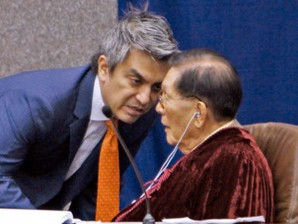Enrile, Estrada, Pangilinan, Sotto, Lacson, Angara: Tiangco testimony irrelevant

WHISPERER Rep. Tobias Tiangco whispers to Senate President Juan Ponce Enrile, the presiding officer of the impeachment court, at the session hall on Tuesday. EDWIN BACASMAS
In separate interviews, Senate President Juan Ponce Enrile, Senate President Pro Tempore Jose “Jinggoy” Estrada, Majority Leader Vicente “Tito” Sotto III and Senators Francis “Kiko” Pangilinan, Panfilo “Ping” Lacson and Edgardo Angara observed that RepresentativeTobias Tiangco’s testimony was irrelevant.
“I’ll tell them, that’s enough. Go directly to the substance of Article 2,” Enrile said before the day’s proceedings.
The second impeachment article alleges that the Chief Justice committed culpable violation of the Constitution and betrayal of public trust for alleged underdeclaration and nondeclaration of the true state of his wealth in his statement of assets, liabilities and net worth (SALN).
“No materiality to the court. It just so happen that the presiding officer displayed some liberality to the prosecution (and this explains the) liberal treatment for the defense,” Lacson said.
“How the House conducts its own business, it’s their own lookout. We’re not going to be my brother’s keeper,” Angara said. “It doesn’t matter how you can transmit and what option they choose to bring it up here. That’s immaterial to us.”
‘Grave coercion’
But Speaker Feliciano Belmonte Jr. and other House leaders may be liable for grave coercion and violation of the antigraft law for allegedly putting pressure on congressmen to sign the impeachment complaint against Chief Justice Renato Corona.
Senator Miriam Defensor-Santiago raised this possibility on Tuesday as she questioned Tiangco of Malabon-Navotas on the second day of his testimony as the first defense witness.
Tiangco on Monday testified that Belmonte had called for an “all-majority caucus” on December 12 last year in which Representative Niel Tupas Jr., the chief House prosecutor, presided over a video presentation summarizing the eight articles of impeachment to be lodged against Corona.
Belmonte then declared that Corona’s impeachment was “nondebatable” and that “no questions will be entertained” about the complaint that the Speaker wants 120 or so congressmen present to sign, according to Tiangco, who claimed he said he was then hesitant to sign the complaint because he had not seen it.
Tiangco recalled his earlier refusal to sign another impeachment complaint against former Ombudsman Merceditas Gutierrez caused the delay in the release of his Priority Development Assistance Fund (PDAF), a form of pork barrel, last year.
Still, Tiangco did not sign the complaint against Corona and even delivered a privilege speech denouncing the pressure that House leaders allegedly exerted to have the complaint signed by at least one-third of the chamber’s members.
Santiago read part of the Anti-Graft and Corrupt Practices Act stating that “persuading, inducing or influencing another public officer to perform an act” constituted a violation of the law.
“Since you are claiming that you felt you were being threatened to sign the impeachment complaint, I would like to know whether you believe that what I just read applies to the situation you experienced,” the senator asked.
Tiangco answered in the affirmative.
Santiago then read the Revised Penal Code definition of grave coercion.
“You felt pressured and you resented it… (Does) this apply to (your) situation,” she asked.
Tiangco asserted that aside from the December 12 episode, another incident that took place before he testified on Monday would also fall under this accusation.
Expulsion threat
Tiangco recalled that House Majority Leader Neptali Gonzales II “came out with statements that I would be expelled from Congress” should Tiangco testify against his colleagues.
Santiago noted that Tiangco was “in a peculiar situation” since he appeared in the trial as an adverse witness testifying against his colleagues.
“The testimony of an adverse witness carries far more weight than the testimony of an ordinary witness … In the case of an adverse witness … what he says carries greater weight as he testifies against his own interest,” the senator explained.
“Normally you don’t testify against your own colleagues unless you are a sociopath,” she noted.
Santiago, a former Quezon City trial judge, said the only way House prosecutors can impeach Tiangco as a witness is to prove that he lied under oath and had a “nefarious motive.”
She pointed out that Tiangco refused to sign the impeachment complaint against Corona even if the Chief Justice is a known ally of former President Gloria Macapagal-Arroyo, his “archenemy.”
Tiangco said he established his link with the opposition during the Arroyo administration. To douse suspicions that he appeared in the trial for political reasons, the congressman said that he did not intend to run for senator and did not testify to gain publicity.
Defense lawyers said that although they failed to stop the trial putting Tiangco on the witness stand showed serious flaws in the House move.
Serafin Cuevas, the chief defense counsel, said in an interview later that Tiangco’s testimony proved the “conclusion that some of those who had affixed their signature in the complaint did not do it voluntarily.”
“That would be material and pertinent (later in the proceedings),” Cuevas said.
Tiangco got his PDAF
Budget Secretary Florencio Abad in a statement Tuesday dismissed Tiangco’s claim that the lawmakers were coerced into signing the impeachment complaint by dangling their pork barrel fund.
“On the contrary, the PDAF of legislators who voted against these impeachment complaints were released in 2011,” Abad said, stressing that Tiangco got P70 million in PDAF in November 2011. With reports from Michael Lim Ubac and Norman Bordadora